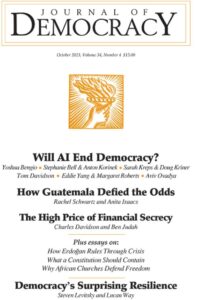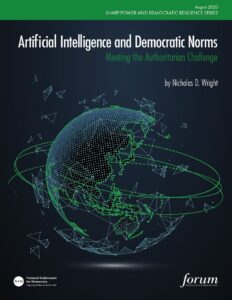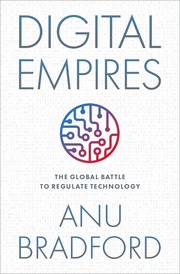 Will artificial intelligence end democracy? In a new special package on AI and democracy, top experts weigh in on what a fast-developing technology that promises superhuman intelligence means for humanity and the political life that governs us, The Journal of Democracy reports:
Will artificial intelligence end democracy? In a new special package on AI and democracy, top experts weigh in on what a fast-developing technology that promises superhuman intelligence means for humanity and the political life that governs us, The Journal of Democracy reports:
- AI with superhuman abilities could emerge within the next few years, warns Yoshua Bengio. We must act now to protect democracy, human rights, and our very existence.
- Generative AI can flood democratic societies with misinformation—sowing confusion for voters and government officials alike, write Sarah Kreps and Doug Kriner.
- Science fiction may soon become reality with the advent of AI systems that can independently pursue their own objectives. We need to establish guardrails now, writes Tom Davidson.
- AI is set to become a new stage for geopolitical conflict. In this contest, explain Eddie Yang and Margaret E. Roberts, autocracies have the advantage.
- AI will transform work and entire economies, bringing dire risks of rising inequality and job losses. But the worst outcomes can still be avoided write Stephanie A. Bell and Anton Korinek.
- Advances in AI are rapidly disrupting the foundations of democracy. We must reinvent our democratic infrastructure, argues Aviv Ovadya, to fit a different technological world.
 Foreign intelligence services are using generative AI to boost their influence operations, analyst Marietje Schaake writes for The Financial Times. Her Stanford colleague, Alex Stamos, warns that: “What once took a team of 20 to 40 people working out of [Russia or Iran] to produce 100,000 pieces can now be done by one person using open-source gen AI”.
Foreign intelligence services are using generative AI to boost their influence operations, analyst Marietje Schaake writes for The Financial Times. Her Stanford colleague, Alex Stamos, warns that: “What once took a team of 20 to 40 people working out of [Russia or Iran] to produce 100,000 pieces can now be done by one person using open-source gen AI”.
There are steps we can take to prevent this new technology from causing unpleasant surprises, Schaake adds:
- Independent audits for bias and research into disinformation efforts must be supported.
- AI companies should offer researchers access to information that is currently hidden, such as content moderation decisions.
- International teams should study the elections taking place this year, such as those in the Netherlands, Poland and Egypt, to understand how AI plays a role.

Do people judge algorithmic decisionmaking more harshly than human decisionmaking? In the future, will people be willing to hold algorithms accountable through legal channels for unfair, incorrect, or problematic decisions? New RAND survey results offer some insights.
Writing in Time magazine, RAND experts explain that generative AI offers the potential to transform China’s social media manipulation “into something far more effective, and thus far more dangerous to the U.S. and other global democracies.”
During a recent discussion hosted by the FCC, Professor Anu Bradford from Columbia Law School, an expert in international trade law and digital regulation, emphasized the significance of AI regulation, Cryptopolitan reports. Bradford – the author of Digital Empires – says, “There’s a recognition that AI is one of the most important ‘theaters of war.’ That’s where the most important battles are being fought and where you cannot afford to be left behind.”
As the US and the EU grapple with diverse regulatory challenges and mixed models emerging worldwide, Professor Bradford concluded, “That leaves the US and the EU with a very big challenge that if they cannot show to themselves and to the world that there is a liberal democratic way to govern tech companies, the true digital empires are either the authoritarians or the tech companies, and that is a very disconcerting outcome for anybody who believes in liberal democracy as a foundation for human engagement and our digital society.”
AI companies seeking profits do not also seek to promote democratic values, notes @Stanford_GDPi expert @MarietjeSchaake https://t.co/aVevDHvjP7 via @financialtimes
— Democracy Digest (@demdigest) October 3, 2023







